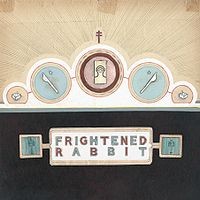I walk through the black iron gates at the end of the short pedestrian tunnel and onto the sidewalk of downtown Pittsburgh, plug the headphones into the iPod jack, turn up the volume and start "Things," the first track on The Winter of Mixed Drinks by Frightened Rabbit, the veteran band from Glasgow. Background sound is drowned out, the persistent bass pedal accompanies the throbbing guitar, and Scott Huchison's Scottish accent and existentialist lyrics--a constant theme spanning the album--demand my attention. Fittingly, a dude in tatters shuffles by, mumbling some shit under his breath. You know he's one of those guys who has stated (albeit more extremely) the same kind of thing Huchison is asking in this song: "I didn't need these things, I didn't need them, oh." And I think, while holding my makeshift briefcase filled with books and paycheck stubs, "Do I need these things? Do I need them?"
So begins Frightened Rabbit's grand album, which displays a sound that has built upon the successes and dismissed the few shortcomings of their sophomore full-length, 2008's The Midnight Organ Fight. It's a band whose sound has reached its full potential. You've got the head-bobbing singles with anthemic choruses in "Nothing Like You" and "Swim Until You Can't See Land." Diving further into the record, you have songs like "Not Miserable" and "FootShooter," which both touch sonically upon the expansive palette of the band's ability to place pop hooks into every instrument and every noise those instruments generate. Fans know, and those new to the band will quickly realize, the group's strength lies in the members' ability to craft hooks in a timely and memorable fashion. In The Winter of Mixed Drinks, every instrument has been blended together like a perfect libation. Add the string section from Hauschka, labelmates on FatCat Records, as a complementary cherry, and you are presented with a finely crafted beverage with just enough alcohol and flavor that leaves you soaked and wanting more of this record. The longing wish that I had while listening to Midnight Organ has been granted with this record, and Frightened Rabbit has extended the hooks of the songs into longer measures; they are entertaining and stick in your lobes and pull your ears and head into the holes that Hutchison describes digging in many songs. Check out "The Loneliness and the Scream" and "Not Miserable," and you'll notice the further the band allows the musical hooks to extend, the more intoxicating the music becomes.
The record's addictive melodies and hooks are balanced with crescendos of rhythmic din. Take "Skip the Youth"--one of the outstanding highlights of the record--for example. It begins with pulsing noise, and the band builds the percussion and the keyboard and squealing of guitar feedback until the cacophony is quieted suddenly by lyrics about being worn down by the energies and endless push of youth. The music, then, builds off the lyrics, pacing steadily until the catharsis of the song arrives at your door and slaps you in your face with a very memorable climax that states: "skip the youth, it's aging me too much." The band twists this idea of crescendo into many of their songs. In "The Wrestle," they attack acoustic guitars, and Grant Hutchison pounds the skins relentlessly while backup vocals add beauty to the struggle. (The essence of the song, anyway, is about the "struggle" of sex [perhaps between ex-lovers], isn't it?)
The lyrics mention instances of drowning, being buried alive, swimming in the sea and not being rescued, and other lonely, sometimes violent, imageries. Hutchison did write a majority of the record in a small, remote coastal town in Scotland, which explains the references to the sea, and he has mentioned in interviews that during this record he pushed his consciousness into a place he's never been to explore new territories of himself. While it was a trying experience, the metaphors push the meaning of the songs away from Hutchison and into the hands of the listener, which seems intentional and is a departure from the relationship-heavy lyrical focus on Midnight Organ.
The band accompanies Hutchison in exploring new territory; they've pushed their sound far from land and into the sea of their vast potential. The record leaves you with a sense of purpose, but at the same time has you asking yourself questions of your own existence, like that bum shuffling through Pittsburgh had me questioning myself. In the end, I'll be asking myself daily if I need these "things," but I'll be doing that and much more because I won't stop listening to the messages within the music of this excellent record.
